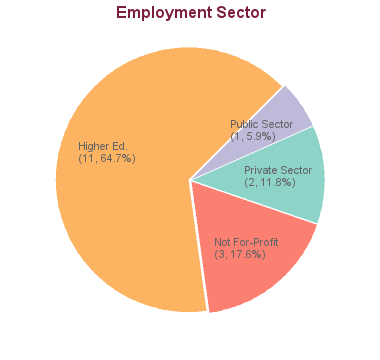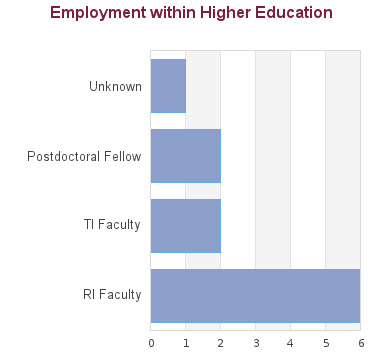
Sharon Fortney
Job Title
Curator of Indigenous Collections and Engagement
Employer
Museum of Vancouver

The Department of Anthropology advances the study and constructive understanding of human diversity and commonality, across the globe and throughout the long span of human existence. We pursue this aim through excellence in research, teaching, and community collaboration, grounded in multiple analytical and interpretive methods that share a commitment to field-based inquiry. Interdisciplinary contacts are encouraged, and links are maintained with departments and programs such as Asian Studies, the Institute of Asian Research, Linguistics, History, Geography, Sociology, and the Centre for Women's and Gender Studies.
We are the second oldest anthropology program in Canada, with more than six decades of research and teaching to our name. Our students are supported by a dedicated staff and faculty and access to outstanding research resources, such as the Museum of Anthropology and Laboratory of Archaeology. Today, UBC anthropology faculty and students conduct original research throughout BC and around the world.
The PhD program provides students with the opportunity to structure a course of study towards specific intellectual and practical interests. A student first gains full standing as a doctoral candidate within the Department by completing the following requirements:
Once they have attained candidacy, students then proceed with research and preparation of a PhD dissertation. The candidate completes the degree upon successfully defending their dissertation in the University examination. Students are expected to attain their degrees within six years.
The Faculty of Graduate and Postdoctoral Studies establishes the minimum admission requirements common to all applicants, usually a minimum overall average in the B+ range (76% at UBC). The graduate program that you are applying to may have additional requirements. Please review the specific requirements for applicants with credentials from institutions in:
Each program may set higher academic minimum requirements. Please review the program website carefully to understand the program requirements. Meeting the minimum requirements does not guarantee admission as it is a competitive process.
Applicants from a university outside Canada in which English is not the primary language of instruction must provide results of an English language proficiency examination as part of their application. Tests must have been taken within the last 24 months at the time of submission of your application.
Minimum requirements for the two most common English language proficiency tests to apply to this program are listed below:
Overall score requirement: 100
Reading
25
Writing
25
Speaking
22
Listening
22
Overall score requirement: 7.5
Reading
6.5
Writing
6.5
Speaking
6.5
Listening
6.5
Some programs require additional test scores such as the Graduate Record Examination (GRE) or the Graduate Management Test (GMAT). The requirements for this program are:
The GRE is not required.
Applicants should have completed a MA in Anthropology, although the program may in special circumstances admit students with a Masters degree in a related subject.
All applicants have to submit transcripts from all past post-secondary study. Document submission requirements depend on whether your institution of study is within Canada or outside of Canada.
A minimum of three references are required for application to graduate programs at UBC. References should be requested from individuals who are prepared to provide a report on your academic ability and qualifications.
Many programs require a statement of interest, sometimes called a "statement of intent", "description of research interests" or something similar.
Students in research-based programs usually require a faculty member to function as their thesis supervisor. Please follow the instructions provided by each program whether applicants should contact faculty members.
The most important first step in applying for admission to our graduate program is finding and approaching a potential supervisor in the department. This gives you an opportunity to discuss the research you are interested in completing as a graduate student and to determine if there is a good ‘fit’ with faculty expertise. Please be aware, however, that all admissions decisions are made by committee and are only communicated after the application deadline following full review of all submitted applications.
Permanent Residents of Canada must provide a clear photocopy of both sides of the Permanent Resident card.
All applicants must complete an online application form and pay the application fee to be considered for admission to UBC.
UBC offers graduate study in the fields of socio-cultural anthropology (including legal, medical, and ecological anthropology, oral and expressive culture, religion, globalization, and applied anthropology), linguistic anthropology, anthropological archaeology, biological anthropology, and museum studies. Faculty research interests include North America, Asia (Russia, India, Japan, and Korea), Mesoamerica, South America, Oceania, Europe, and Africa. The program provides training in quantitative, qualitative, archaeological and museum methods.
Extensive research facilities are available in the Museum of Anthropology, and in the Laboratory of Archaeology. The UBC Library has excellent collections to support program interests, as well as a large collection of microform theses and dissertations, and the Human Relations Area files. Anthropology has a dedicated graduate computer lab with a wide range of software to support quantitative and qualitative research.
| Fees | Canadian Citizen / Permanent Resident / Refugee / Diplomat | International |
|---|---|---|
| Application Fee | $116.25 | $168.25 |
| Tuition * | ||
| Installments per year | 3 | 3 |
| Tuition per installment | $1,875.34 | $3,294.66 |
| Tuition per year (plus annual increase, usually 2%-5%) | $5,626.02 | $9,883.98 |
| Int. Tuition Award (ITA) per year (if eligible) | $3,200.00 (-) | |
| Other Fees and Costs | ||
| Student Fees (yearly) | $1,144.10 (approx.) | |
| Costs of living | Estimate your costs of living with our interactive tool in order to start developing a financial plan for your graduate studies. | |
Applicants to UBC have access to a variety of funding options, including merit-based (i.e. based on your academic performance) and need-based (i.e. based on your financial situation) opportunities.
All full-time students in UBC-Vancouver PhD programs will be provided with a funding package of at least $24,000 for each of the first four years of their PhD from September 2024. The funding package may consist of any combination of internal or external awards, teaching-related work, research assistantships, and graduate academic assistantships. Please note that many graduate programs provide funding packages that are substantially greater than $24,000 per year. Please check with your prospective graduate program for specific details of the funding provided to its PhD students.
This results in a net balance (any funding provided to the student minus tuition and fees) mean of $33,309 and median of $31,143.
All applicants are encouraged to review the awards listing to identify potential opportunities to fund their graduate education. The database lists merit-based scholarships and awards and allows for filtering by various criteria, such as domestic vs. international or degree level.
Many professors are able to provide Research Assistantships (GRA) from their research grants to support full-time graduate students studying under their supervision. The duties constitute part of the student's graduate degree requirements. A Graduate Research Assistantship is considered a form of fellowship for a period of graduate study and is therefore not covered by a collective agreement. Stipends vary widely, and are dependent on the field of study and the type of research grant from which the assistantship is being funded.
Graduate programs may have Teaching Assistantships available for registered full-time graduate students. Full teaching assistantships involve 12 hours work per week in preparation, lecturing, or laboratory instruction although many graduate programs offer partial TA appointments at less than 12 hours per week. Teaching assistantship rates are set by collective bargaining between the University and the Teaching Assistants' Union.
Academic Assistantships are employment opportunities to perform work that is relevant to the university or to an individual faculty member, but not to support the student’s graduate research and thesis. Wages are considered regular earnings and when paid monthly, include vacation pay.
Canadian and US applicants may qualify for governmental loans to finance their studies. Please review eligibility and types of loans.
All students may be able to access private sector or bank loans.
Many foreign governments provide support to their citizens in pursuing education abroad. International applicants should check the various governmental resources in their home country, such as the Department of Education, for available scholarships.
The possibility to pursue work to supplement income may depend on the demands the program has on students. It should be carefully weighed if work leads to prolonged program durations or whether work placements can be meaningfully embedded into a program.
International students enrolled as full-time students with a valid study permit can work on campus for unlimited hours and work off-campus for no more than 24 hours a week during academic sessions.
A good starting point to explore student jobs is the UBC Work Learn program or a Co-Op placement.
Students with taxable income in Canada may be able to claim federal or provincial tax credits.
Canadian residents with RRSP accounts may be able to use the Lifelong Learning Plan (LLP) which allows students to withdraw amounts from their registered retirement savings plan (RRSPs) to finance full-time training or education for themselves or their partner.
Please review Filing taxes in Canada on the student services website for more information.
Applicants have access to the cost estimator to develop a financial plan that takes into account various income sources and expenses.
18 students graduated between 2005 and 2013. Of these, career information was obtained for 17 alumni (based on research conducted between Feb-May 2016):


Alumni from our graduate program now work in a wide number of fields both in Canada and across the world: academia, health, Indigenous communities, government and public policy, non-profit organizations, and private business.
These statistics show data for the Doctor of Philosophy in Anthropology (PhD). Data are separated for each degree program combination. You may view data for other degree options in the respective program profile.
| 2023 | 2022 | 2021 | 2020 | 2019 | |
|---|---|---|---|---|---|
| Applications | 43 | 40 | 61 | 48 | 44 |
| Offers | 9 | 10 | 9 | 4 | 7 |
| New Enrolment | 5 | 4 | 7 | 4 | 6 |
| Total Enrolment | 44 | 45 | 48 | 46 | 50 |
Students in research-based programs usually require a faculty member to function as their thesis supervisor. Please follow the instructions provided by each program whether applicants should contact faculty members.
The most important first step in applying for admission to our graduate program is finding and approaching a potential supervisor in the department. This gives you an opportunity to discuss the research you are interested in completing as a graduate student and to determine if there is a good ‘fit’ with faculty expertise. Please be aware, however, that all admissions decisions are made by committee and are only communicated after the application deadline following full review of all submitted applications.
These videos contain some general advice from faculty across UBC on finding and reaching out to a supervisor. They are not program specific.
| Year | Citation |
|---|---|
| 2015 | Dr. Komarnisky studied Mexican migrants in Alaska. She found that both locations, and a shared experience of mobility between them, are what makes these people feel at home in the world. This study adds to our understanding of migration patterns and experiences of place, and can contribute to policies that improve the lives of migrants everywhere. |
| 2015 | Dr. Shepard worked with several endangered language communities to examine how cultural beliefs impact ideology around language preservation. He explored issues of sovereignty, indigeneity, public dissemination of knowledge and archive management. The research identifies strategies for increasing the efficacy of Native language preservation efforts. |
| 2014 | Dr. Nitsan worked with the Guatemalan campaign to end violence against women, to examine tensions between theory and practice within the women's human rights discourse. She argues that, to promote transformative social change, those rights are framed in terms of dignity, grounded in women's diverse life experiences and emphasize agency and self-worth. |
| 2014 | Dr. LaSalle studied the history, community and landscape of Pacific Spirit Regional Park in Vancouver. She demonstrated how "nature" in the park is manufactured to forget colonial violence and to feel better about ongoing environmental devastation. Pacific Spirit is thus a site of ideology, ultimately hindering resistance to industrial capitalism. |
| 2014 | Dr. Condin studied Duchenne muscular dystrophy, a fatal genetic disease diagnosed in boys. He examined how families cope with the illness, and their experiences testing new genetic treatments in clinical trials. His research will help to incorporate patient views into healthcare delivery, and to develop personalized treatments for rare diseases. |
| 2014 | Dr. Marsh studied fossil exhibits at the Smithsonian. She identified how they have been shaped by new communication techniques, professional cultures, and institutional divides between research and outreach in the last century. Her work has relevance to institutional ethnographers, historians, public science communicators, and museum practitioners. |
| 2014 | Dr. Baloy examined the ways in which non-Indigenous people learn about Indigenous peoples in Vancouver, a city built on unceded Coast Salish lands. She argued that settler colonialism continues to shape everyday encounters, emotions, and meaning-making. This study illustrates why meaningful reconciliation must thoughtfully engage non-Indigenous people. |
| 2014 | Dr. McKee conducted ethnographic fieldwork among the horse people of Bluegrass Kentucky in order to understand the cultural and historical connections between horse racing, animal slaughter, equine rescue, and prison educational programs. |
| 2014 | Dr. Green explored the secular and ceremonial life of the Nuu-chah-nulth First Nation in the Alberni Valley on Vancouver Island. She found that claims to territory were articulated through material and expressive culture. She also produced a series of ethnographic films about her research in collaboration with Nuu-chah-nulth people. |
| 2014 | Dr. McKechnie's dissertation examines multiple scales of Indigenous history on the Northwest Coast, with a focus on two key domains of human existence: food and settlement. His research demonstrates an enduring coherence in Indigenous oral history and resource use. This offers insight into broader patterns of everyday human history over millennia. |
UBC offers graduate study in the fields of socio-cultural anthropology (including legal, medical, and ecological anthropology, oral and expressive culture, religion, globalization, and applied anthropology), linguistic anthropology, anthropological archaeology, biological anthropology, and museum studies. Faculty research interests include North America, Asia (Russia, India, Japan, Korea and China), Mesoamerica, South America, Oceania, Europe, and Africa.
Departments/Programs may update graduate degree program details through the Faculty & Staff portal. To update contact details for application inquiries, please use this form.

This city won’t disappoint. It has it all: sea, parks, mountains, beaches and all four seasons, including beautiful summers and mild, wet winters with snow.